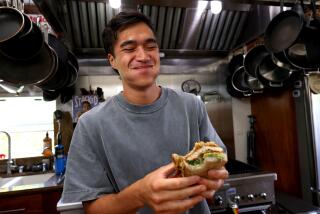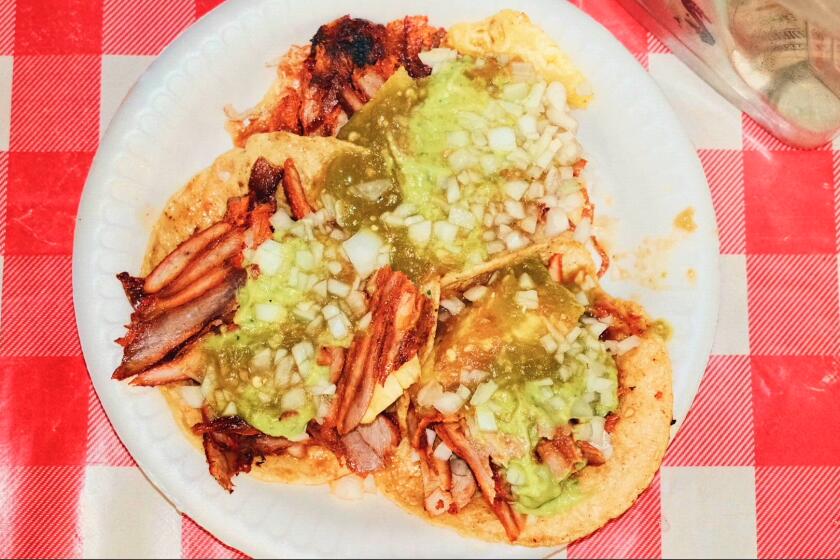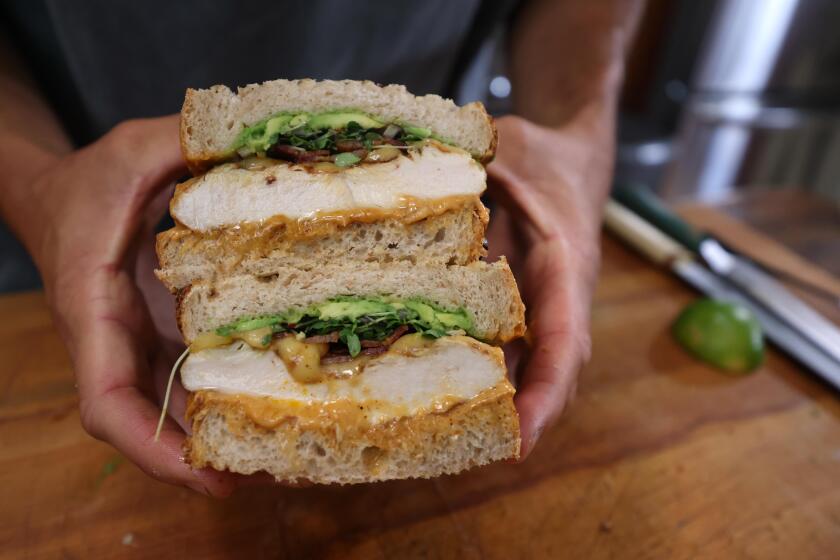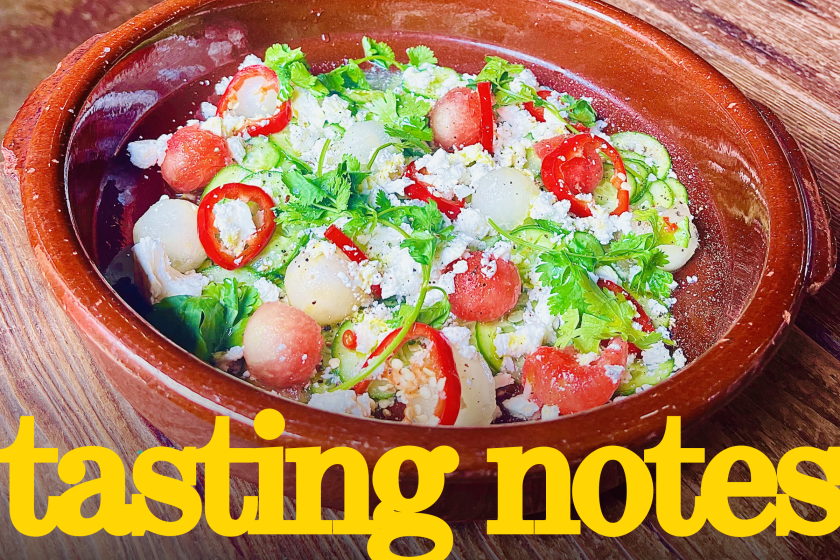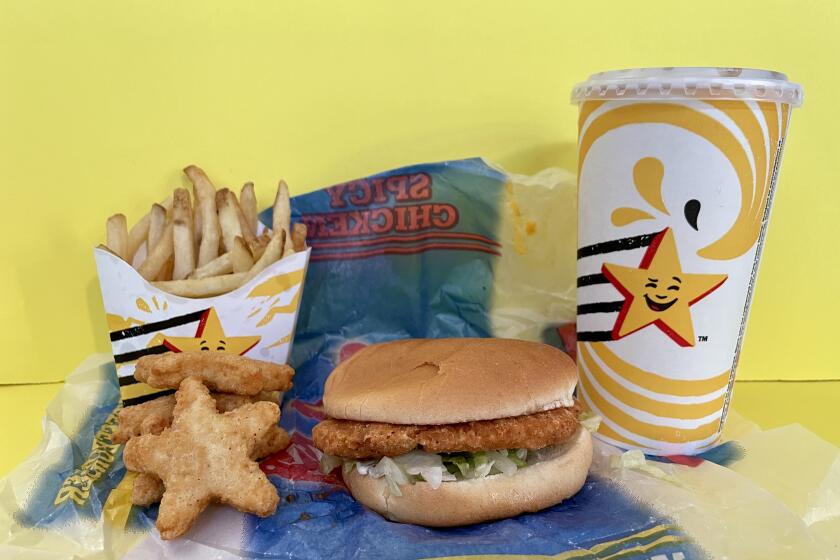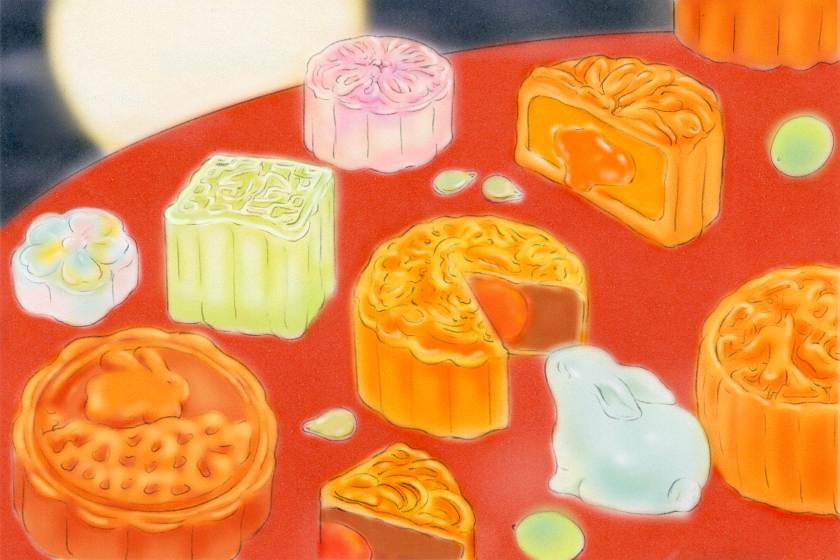Culinary books that more than measure up
If food publishing has a theme this year, it seems to be either celebrity or simplicity. The only wonder is that no one thought to sign Mario Batali to write “The TV Dinner Doctor” or Bill O’Reilly for “The Falafel Factor.”
Bucking the dominance of ghostwriters and recipe makers paid to put a personal patina on books “by” the famous, here are five exceptional choices with honest voices and deep knowledge:
The most significant is the 2004 revision of 1984’s most significant culinary title, Harold McGee’s “On Food and Cooking: The Science and Lore of the Kitchen” (Scribner: 884 pp., $35). This remains the single best sourcebook for anyone who has even the faintest interest in food, not just because it is full of information on everything edible but because it is such an engaging exploration of chemistry, biology, nutrition, history, folklore and much more. McGee actually makes science seductive.
Other food books give you the how; McGee explains the why. His book could be read straight through, but it is designed for browsing. Short segments cover every conceivable food issue, such as why fish is so tricky to cook (muscle fibers evolved to work best at cold temperatures) or what makes some Sauvignon Blanc smell like guava (sulfur compounds).
Best of all, McGee has bulked up his cornucopia with ingredients that were unfamiliar, if not unknown, two decades ago, including lotus root and balsamic vinegar. The shelf life of this incarnation should be even longer as a result. His segment on meat- and food-borne infections is sure to be read many times during the next 20 years.
Thomas Keller’s “Bouchon” (Artisan: 342 pp., $50) is this year’s other big book, in every sense of the word. A follow-up to his “French Laundry Cookbook” (which sold more than half a million), “Bouchon” showcases dishes and scenes from his Napa Valley bistro and allows a notorious perfectionist to detail recipes that so many other cooks lately have either dumbed down or written by rote.
All the French standards are here, whether quiches or coquilles St. Jacques, but many more daring ideas are laid out, including frog legs and stuffed duck neck. In every case the recipes are so well written that even someone who couldn’t tell a stove from a microwave has an excellent roadmap to get from raw cauliflower to oozing gratin. Old cooks can also learn new tricks: Keller improves on perfect roast chicken by insisting that the bird be dried well before being cooked, so that the skin crisps rather than steams.
With photography by Deborah Jones, “Bouchon” could pass for food porn, but it is so smart that it’s invaluable. Unfortunately, it weighs slightly less than a suckling pig. It should be sold like “Helmut Newton’s SUMO,” with its own stand.
“The Contemporary Encyclopedia of Herbs & Spices” (Wiley: 404 pp., $40) is intended to attract dustings of fenugreek and drippings of gumbo with sassafras. Tony Hill lards his book with recipes that make you want to measure out anise-hyssop and cardamom lavishly after reading one of his chapters on the origins, alternate names and significant uses for both exotic and predictable seasonings.
Hill, who did much of his research while traveling as proprietor of the World Merchants spice and tea house in Seattle, is way ahead of cookbook authors who cling to parsley in a cilantro world. With spices so widely available on the Internet, he encourages exploration, not only describing what nigella seeds are (not spawn of Lawson but an Indian flavoring) but how to use them (to bake surprisingly easy crackers for cheese). This is the book for anyone who has been lucky enough to find grains of paradise or Aleppo pepper and wonders where to go from there.
“Schott’s Food & Drink Miscellany” (Bloomsbury: 160 pp., $14.95), which no doubt will stuff many stockings this Christmas, is much richer than it might seem. It’s one of the few food books I read in a single sitting from introduction to closing quote: “She was a good cook, as cooks go, and as cooks go, she went.”
Ben Schott has produced a miniature equivalent of Food Google, crammed with jokes such as the proper term (canivorous) for creatures that eat a certain item (dog) and quotes such notables as Cardinal Richelieu (“If God forbade drinking, would He have made wine so good?”). A section on “Swift’s wind” (you can guess) is countered by a mini-treatise on favism (a real reaction to fava beans). Schott’s is a loose and loopy foray into one man’s definition of meat.
Finally, if the late Julia Child’s mantra was “Never apologize,” Jay Rayner takes the opposite tack in “Eating Crow” (Simon & Schuster: 292 pp., $23) by weaving an entertaining story of a hyper-snarky restaurant critic who becomes a professional apologist after a chef he skewered decides that death is preferable to a bad review. (One line: The victim “should have the good sense not to order any of his dishes as his last meal.”) As a novel, it’s a little far-fetched, but the cynicism, coupled with Rayner’s ingrained knowledge as restaurant critic for the London Observer, makes it much easier to swallow than the cloying fiction that uses food only as a plot device.
Rayner’s plot verges a little too close to the edge of a three-legged table, but he repeatedly saves himself with lines like “[I]t is far better to start off overweight than to become so. That way you disappoint no one, least of all yourself.” Or, in dissing the doomed chef, “By his choice of profession he ensured that animals died in vain.” A writer who knows he is funniest when he is cruelest is not to be underestimated. *
More to Read
Eat your way across L.A.
Get our weekly Tasting Notes newsletter for reviews, news and more.
You may occasionally receive promotional content from the Los Angeles Times.
